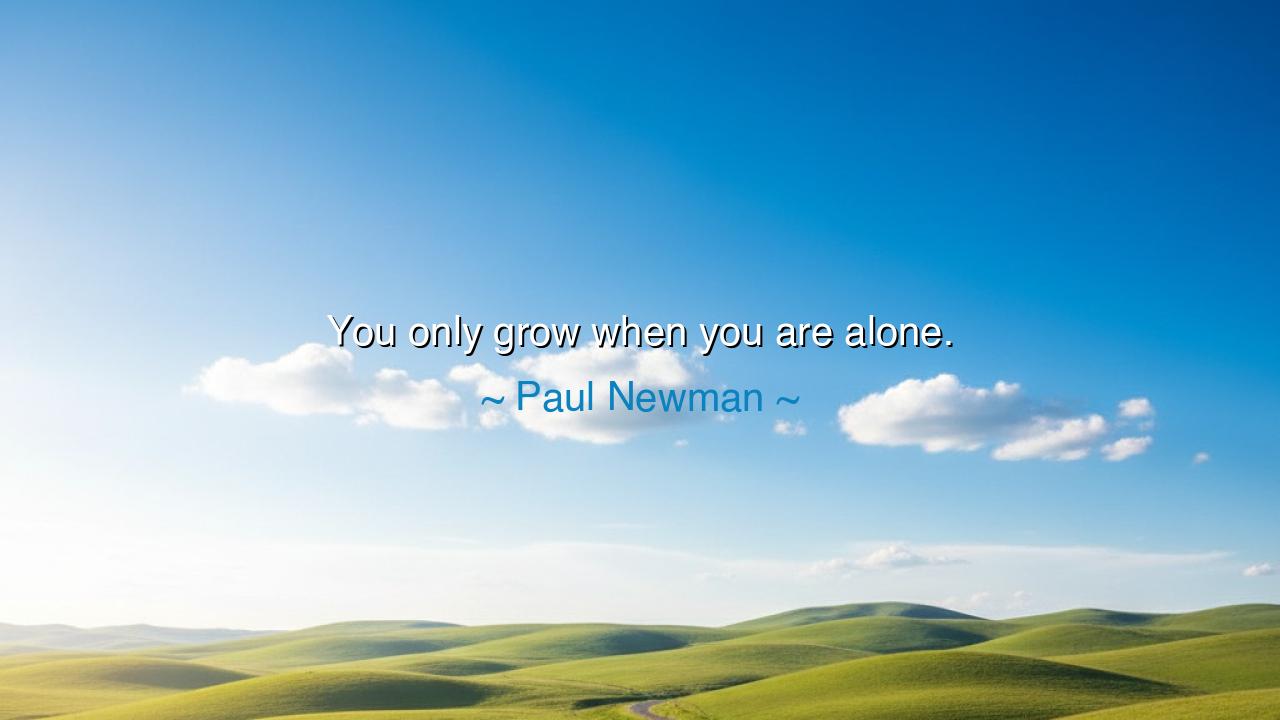
You only grow when you are alone.






"You only grow when you are alone." These words, spoken by the legendary Paul Newman, carry a profound truth that speaks to the heart of human growth and self-discovery. In a world that often praises companionship and community, Newman’s reflection shines a light on the paradox that sometimes, the deepest growth occurs in moments of solitude. To be alone is not to be abandoned or lost, but to find the space to engage with one’s innermost thoughts, emotions, and desires. It is in these moments of isolation that we are forced to confront who we truly are, free from the influence of others, and it is here that true transformation occurs.
In the ancient world, the philosophers and wisdom seekers often retreated to the solitude of caves, mountains, or forests to engage in deep reflection and self-examination. Socrates, though a man of dialogue and community, often emphasized the importance of inner reflection. His famous dictum, "Know thyself", implies that true wisdom comes not from outward conversation alone, but from a deep introspection. Even in his dialogues, Socrates often urged his students to examine their own thoughts and assumptions. This search for self-knowledge could only truly occur when one was alone, free from the distractions of the outside world.
Consider the life of Gandhi, who, in his journey toward self-realization and freedom, spent many years in solitude, both physical and mental. He often retreated to his ashrams to engage in meditation and reflection. In the quiet of these moments, Gandhi not only refined his understanding of non-violence and truth, but also grew in his ability to lead with profound moral clarity. His solitude was not an escape, but a means of cultivating inner strength and wisdom. It was in these periods of aloneness that he faced his greatest internal struggles, and it was from these struggles that his strength to lead others was born.
Newman’s words are a call to embrace solitude, not as something to fear, but as an essential part of the human experience. The world can often overwhelm us with its noise, its demands, and its expectations. But when we are alone, free from the constant chatter and expectations of others, we can begin to hear the deeper whispers of our hearts. Solitude provides the space to explore our own desires, our own fears, and our own potential. It is only in such moments that we can come to terms with the truth of who we are, without the distractions of external influences or the need to please others.
The lesson that Newman imparts is clear: growth comes not just through action in the world, but through moments of quiet reflection. Think of the great warriors and leaders of history, who, though surrounded by armies and followers, found their true strength in times of solitude. Alexander the Great, in his quest to conquer the known world, often retreated to solitary moments, where he could wrestle with his own doubts and desires. His conquests, though marked by external victories, were built upon the internal strength he cultivated in moments of aloneness. Even in the act of leading, Alexander understood that growth came from looking within, from the silence where one confronts the self.
Practical action in response to Newman’s wisdom is to embrace moments of solitude in our own lives. Rather than seeking constant company or validation from others, we must find time to be alone with our thoughts. This does not mean cutting ourselves off from the world or isolating ourselves in unhealthy ways, but rather carving out space for reflection and growth. Whether through meditation, journaling, or simply sitting in stillness, we can begin to unlock the deeper parts of ourselves and confront the questions that drive us. In solitude, we can find not only clarity but the strength to act with purpose and integrity in the world.
The true test of growth, then, is not in our accomplishments or the praise we receive from others, but in how we transform internally when we are alone. It is in the silence that we discover our deepest truths and face the parts of ourselves that may otherwise remain hidden. Just as Buddha sought enlightenment under the tree, and Jesus spent forty days in the wilderness, we too must learn the value of stepping away from the world in order to confront the quiet truths within. In doing so, we will emerge stronger, wiser, and more fully realized.
In conclusion, Paul Newman’s reflection serves as a timeless reminder that solitude is not to be feared, but embraced as an essential part of our growth. Just as the greatest minds and leaders throughout history understood that true strength is cultivated in times of quiet reflection, so too must we value the moments we spend alone. Let us learn to embrace the stillness, for it is in those moments that we find not only ourselves, but the courage to live fully in the world, guided by the wisdom we have gained in our own company.






AAdministratorAdministrator
Welcome, honored guests. Please leave a comment, we will respond soon